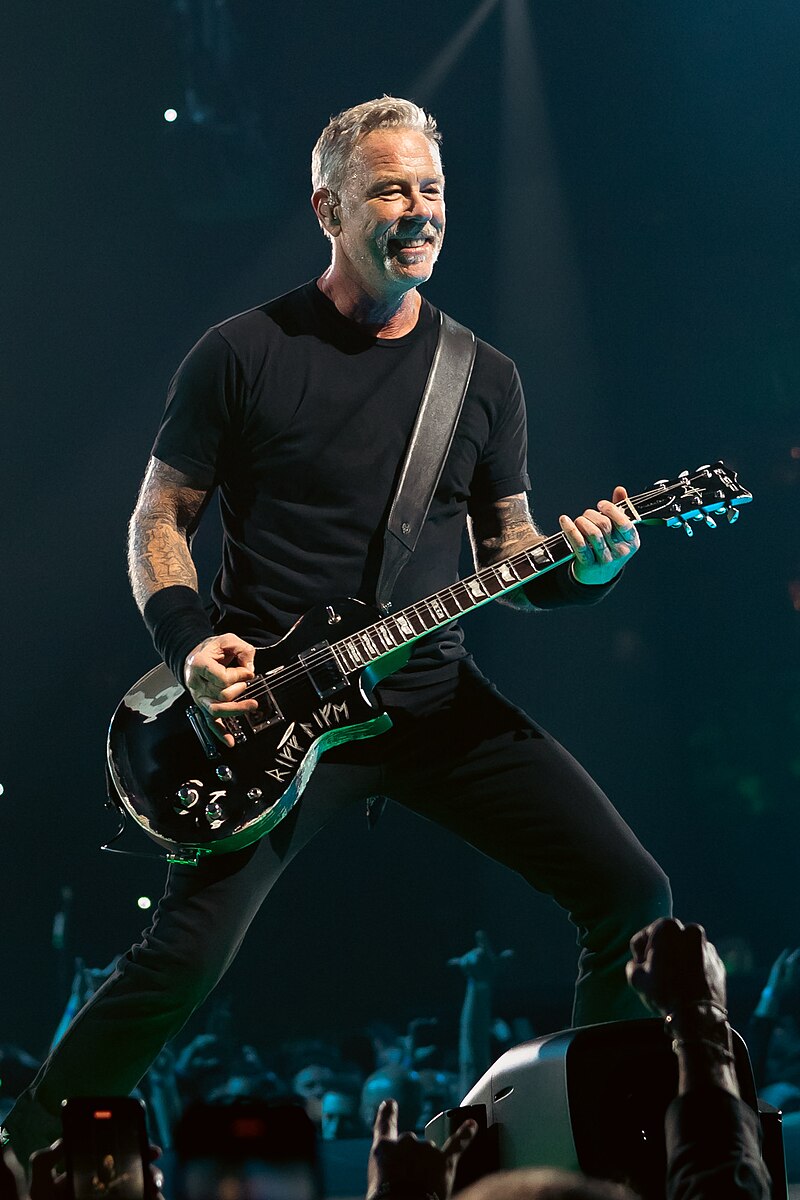James Hetfield - A Life In Metal
When we think about the people who truly shape the sound of rock, James Hetfield’s name comes up pretty quickly. He is, in a way, a central figure in the sound of heavy music, a person whose voice and guitar work have, over many years, left a big mark on countless listeners. This American musician, born on August 3, 1963, has, you know, been at the very heart of one of the biggest and most influential thrash metal groups ever, a band that really changed the game for a lot of people who enjoy loud guitars and powerful singing.
His presence, too, is almost unmistakable. As the main voice and guitar player for Metallica, James Hetfield has, in some respects, become a sort of legend, a "rock god" as some might say. His public image, often seen as rather tough and unyielding, has grown both without him fully planning it and, perhaps, with a little bit of thought behind it. This blend of natural character and a bit of shaping has given him a unique place in the eyes of many music enthusiasts, basically.
Over the years, this figure has been involved in many significant moments, from telling crowds "The end" at shows to sharing deeper thoughts about his creative process. He has, you know, shown a consistent commitment to his art and his audience, which is something that truly resonates with people who follow his work. His journey, from a young musician to a seasoned performer, has been quite something to witness, honestly.
Table of Contents
- The Story of James Hetfield - An Early Look
- What Makes James Hetfield a True Rock Figure?
- How Did Childhood Experiences Shape James Hetfield's Music?
- Moments of Trial - The Montreal Incident and James Hetfield's Resilience
- Paying Tribute - Does James Hetfield Reference Past Hits?
- The Enduring Legacy of James Hetfield - Over Four Decades Strong
- What Insights Come from James Hetfield's Conversations?
- What Did James Hetfield Mean by "The End"?
The Story of James Hetfield - An Early Look
James Alan Hetfield, who came into the world on August 3, 1963, is an American musician whose name is really tied to the powerful sound of heavy music. His early life, while not detailed in every aspect here, clearly set the stage for a career that would see him become a leading voice in a genre known for its intensity and raw feeling. He was, in a way, destined to connect with an audience that craved something different, something with a bit more punch. This musician, as a matter of fact, began a path that would lead him to huge stages and millions of fans, shaping the very idea of what a rock frontman could be.
His rise to widespread notice came, of course, as the main singer and guitarist for Metallica, a group that quickly became known for its fast, aggressive style. This band, under his guidance, helped to define what many people now call thrash metal, creating a sound that was both heavy and intricate. It's interesting, too, that he's also known by the affectionate nickname "Papa Het," which suggests a slightly different, perhaps more paternal, side to his public person. This shows, in some respects, how he’s seen as a foundational figure, a guiding force for many who admire his work and the music he helps to make.
Personal Details and Bio Data for James Hetfield
| Full Name | James Alan Hetfield |
| Date of Birth | August 3, 1963 |
| Place of Birth | United States |
| Nationality | American |
| Known For | Frontman, vocalist, and rhythm guitarist for Metallica |
| Nickname | Papa Het |
| Years Active | Over 40 years as of current information |
What Makes James Hetfield a True Rock Figure?
What is it, really, that makes James Hetfield stand out as a genuine icon in the world of rock? Part of it comes from his position as a "rock god" from one of the most significant thrash metal bands of all time. His persona, a somewhat rugged and powerful presence, has been developed over many years, both without him consciously planning every detail and, perhaps, with a bit of intention behind it. This sort of image, you know, connects deeply with the raw energy of the music, making him a compelling figure on stage and off. He embodies a certain kind of strength, which, frankly, resonates with many who follow the band.
His stage presence, too, is a big part of it. He commands attention, not just with his voice and guitar, but with a general air of authority and passion. It’s the way he delivers the words, the way he moves, the way he connects with the audience that truly makes a difference. This kind of connection, honestly, is what separates a good performer from someone who truly leaves a lasting impression. He has, in a way, mastered the art of being a frontman, drawing people into the experience of the music, which is something very special to witness.
How Did Childhood Experiences Shape James Hetfield's Music?
It's interesting to consider how a person's early life can influence their creative work, and for James Hetfield, this seems to be quite true. During the time when Metallica was working on "The Black Album," a very important record for them, James Hetfield apparently felt comfortable enough to share some of the difficult feelings from his younger days. This personal sharing, in fact, led to the creation of songs like “The God That Failed” and “The Unforgiven.” He himself described it as "that’s me telling the," suggesting these songs were a direct expression of his inner thoughts and experiences, which, you know, is a powerful way to make music.
The act of putting such personal and, perhaps, painful experiences into song is a testament to the idea that music can be a way to process and communicate deep feelings. These particular songs, therefore, became more than just pieces of music; they became a window into the artist’s soul, allowing listeners to connect with him on a more profound level. It shows, basically, that even a "rock god" has a human side, and that sharing those parts of oneself can lead to something truly meaningful for others, which is, in a way, a very brave thing to do.
The power of music, in this sense, is that it allows for an outlet, a way to transform personal struggles into something that can be shared and understood by a wider audience. For James Hetfield, these songs were, you know, a way to make sense of his past and to communicate feelings that might otherwise be hard to express. It's a reminder that artists often draw from their own lives to create something lasting, and that, in fact, is what makes their work so compelling to many people.
Moments of Trial - The Montreal Incident and James Hetfield's Resilience
A significant event in James Hetfield’s career, one that showed his remarkable ability to keep going even when things were tough, happened in 1992. During the well-known Guns N' Roses / Metallica stadium tour in Montreal, Canada, he was, unfortunately, quite badly burned. This happened when he accidentally walked into a pyrotechnic blast during a show. It was, you know, a very sudden and shocking moment that could have, in some respects, stopped anyone in their tracks. The sheer unexpectedness of such an accident during a live performance must have been incredibly jarring for everyone involved, especially for him.
Following this serious incident, the information available mentions that "After 17 days he was..." which, while not giving every detail, strongly suggests a period of recovery and healing. The fact that he was able to return to his role as a performer, especially after such a visible and painful injury, speaks volumes about his dedication and mental fortitude. It shows, basically, a person who is deeply committed to his craft and to his audience, someone who won't let even a major setback keep him from doing what he loves. This kind of resilience, frankly, is something that truly sets certain individuals apart in any field, and it's certainly evident in James Hetfield's story.
This episode, too, highlights the unpredictable nature of live performances and the risks that artists sometimes face. Yet, James Hetfield's response to it, his willingness to get back on stage and continue, reinforced his image as a strong and enduring figure in music. It's a powerful example of how challenges can, in a way, reveal the true character of a person, showing their ability to push through difficulties. His determination, you know, is something that many people find quite inspiring, and it contributes to his lasting legacy as a performer who truly gives his all.
Paying Tribute - Does James Hetfield Reference Past Hits?
It’s quite common for artists to nod to their earlier work, and James Hetfield is, in fact, no different. Listeners who were paying close attention likely picked up on a subtle reference to Metallica’s massive hit, “Enter Sandman,” within the track “King Nothing” from their "Load" album. The phrase “off to never…” used in “King Nothing,” was, you know, a clear tip of the hat to the earlier song. This kind of musical wink to the past can be a fun discovery for long-time followers, making them feel a bit more connected to the band’s ongoing story.
This practice of referencing previous material can, in some respects, serve multiple purposes. It can be a way for the artist to show appreciation for their own history, acknowledging the songs that helped define them. It also creates a sense of continuity for the audience, letting them know that while the music might evolve, there’s still a thread connecting everything. For James Hetfield and Metallica, these kinds of subtle tributes help to build a richer, more layered experience for anyone who enjoys their music, showing that, basically, they remember where they came from.
It’s interesting, too, how these small inclusions can spark conversation among fans, leading them to listen more closely and perhaps discover new connections between songs. This kind of detail, honestly, adds another dimension to the listening experience, turning a simple song into something that holds a bit more meaning. It shows, you know, a thoughtful approach to songwriting that goes beyond just creating new tunes, connecting the present with the past in a clever way.
The Enduring Legacy of James Hetfield - Over Four Decades Strong
James Hetfield has, quite remarkably, spent over 40 years as Metallica’s guitarist and vocalist. This kind of longevity in the music world is, in a way, very uncommon and speaks volumes about his dedication and the band’s enduring appeal. For more than four decades, he has been a consistent force, contributing to countless songs and performances that have, you know, become part of music history. His presence has been central to Metallica’s journey, from their early, raw beginnings to their status as one of the biggest rock groups on the planet, which is, honestly, an incredible achievement.
As a "rock god" from one of the greatest thrash metal bands of all time, James Hetfield has, as mentioned before, developed a certain kind of image—a rough and powerful one—both without fully intending to and with a bit of conscious effort. This image, combined with his consistent musical output, has helped to solidify his legacy. He isn't just a musician; he's a symbol of a certain sound and attitude that has resonated with generations of listeners. His ongoing contribution, basically, ensures that Metallica remains a relevant and powerful voice in music, which is quite something to consider.
The fact that he continues to perform and create after such a long period is, you know, a testament to his passion for music. Many artists come and go, but James Hetfield has remained a steady presence, continuing to explore new sounds while staying true to the core of what makes Metallica special. This sustained effort, in some respects, is what builds a truly lasting legacy, showing that his influence isn't just a fleeting moment but a continuous journey that keeps on giving to his followers.
What Insights Come from James Hetfield's Conversations?
Hearing artists speak about their work can offer a lot of interesting ideas, and James Hetfield has, in fact, participated in a few notable discussions. For instance, the "legendary hard rockers" – referring to Metallica – spoke during a Q&A session after the first showing of 'Metallica Saved My Life' at the Tribeca Film Festival. These kinds of events provide a chance for fans and curious minds to get a bit more personal insight into the creative process and the stories behind the music. It's a way, you know, to bridge the gap between the performer and the audience, making the experience feel more immediate and real.
More recently, there was an interview about their "72 Seasons" album in January 2023. The person who conducted that chat noted that there wasn't a formal or academic way to introduce their conversation, suggesting it was a very direct and perhaps informal exchange. These types of discussions are, in some respects, invaluable because they let us hear directly from the artist about their intentions, their feelings, and the thoughts that go into their creations. It helps, basically, to paint a fuller picture of the person behind the powerful music, which is something many people truly appreciate.
These conversations, too, allow for a deeper appreciation of the music itself. When you hear James Hetfield talk about the inspirations or the challenges behind a song, it can change the way you listen to it. It adds layers of meaning and personal connection that might not be obvious otherwise. It’s a chance, honestly, to get a glimpse into the mind of someone who has spent decades shaping a significant part of music history, and that, you know, is a pretty unique opportunity for anyone interested in his work.
What Did James Hetfield Mean by "The End"?
The phrase "The end, frontman James Hetfield told the crowd" is a curious little piece of information that, you know, appears in the provided text. While the exact situation where he said this isn't fully explained, it's pretty common for performers to use such words at the close of a show or perhaps after a particular song. It’s a way to signal a conclusion, to wrap things up, or to acknowledge the end of a performance segment. This kind of direct address to the audience is, in some respects, a very typical part of a live concert experience, letting everyone know that the moment is drawing to a close.
Without more context, it's hard to say precisely what "The end" referred to in that specific instance. However, it generally serves as a clear, unmistakable signal from the stage. It’s a moment where the artist connects directly with the audience, perhaps thanking them or simply marking the end of a powerful set. This simple phrase, basically, holds a lot of weight in the context of a live show, letting the energy of the performance settle and leaving a lasting impression on those who were there, which is, frankly, a very effective way to finish things up.

James Hetfield admits he's “obsessed” with bird watching: “I've got

James Hetfield – Wikipedia

James Hetfield - The Struggles Along His Journey To Sobriety | Revised 2025